Key takeaways
- Populism emerges from feelings of being overlooked by political elites, simplifying complex issues into a struggle between ‘the people’ and ‘the elite.’
- Political podcasts are increasingly focusing on grassroots movements, fostering authentic conversations that resonate emotionally with listeners.
- Factors driving the resurgence of populism include economic anxiety, rapid social changes, and growing distrust in traditional institutions.
- Engaging with populist ideas effectively involves listening to underlying emotions, challenging simplistic narratives, and sharing diverse stories to foster understanding.
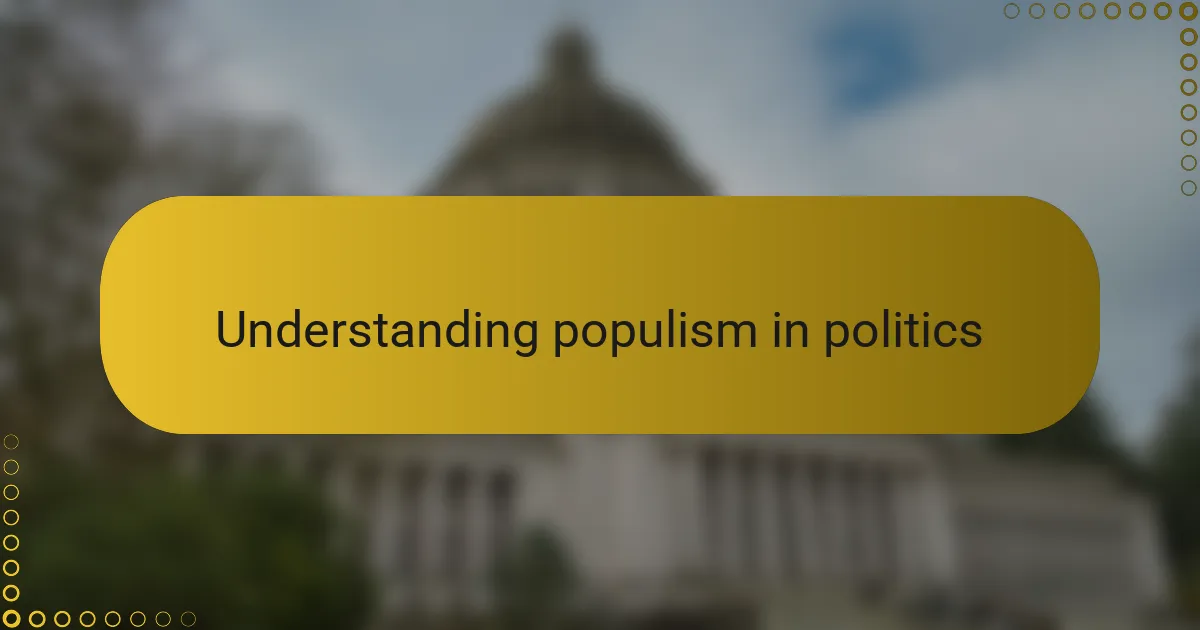
Understanding populism in politics
Populism, in my view, often arises from a deep frustration felt by many who believe their voices are drowned out by political elites. I’ve noticed in conversations with friends and listeners that this feeling of being overlooked creates a powerful emotional undercurrent. Have you ever felt like your concerns were ignored by those in power? That’s exactly the space where populism finds fertile ground.
What strikes me is how populism simplifies complex political problems into a struggle between ‘the people’ and ‘the elite.’ This framing is compelling because it taps into our natural desire for fairness and justice. Yet, it also raises an important question: does this binary view risk overlooking the nuances of governance and policy?
In my experience following US politics, populism is less about a specific ideology and more about a style of politics that emphasizes direct connection to the people. This directness can feel refreshing and authentic, but I wonder—how do we balance this approach with the need for thoughtful, inclusive decision-making? It’s a tension worth exploring.
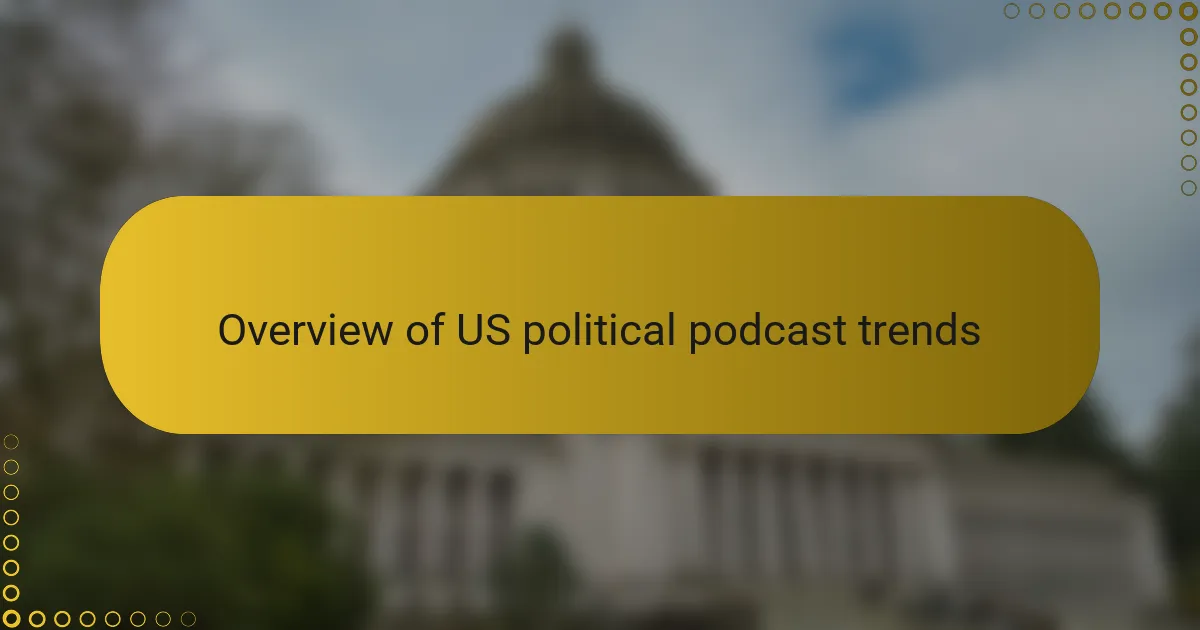
Overview of US political podcast trends
The rise of political podcasts in the US has been remarkable, and I’ve found that these platforms offer a unique space for candid conversations. From what I see, listeners crave authenticity and perspectives that traditional media sometimes misses. Have you noticed how podcast hosts often create a sense of intimacy, almost like you’re eavesdropping on a private chat?
Interestingly, many political podcasts have shifted towards exploring grassroots movements and voices that feel sidelined in mainstream discourse. This trend reflects a broader desire to understand political undercurrents directly from those living them, rather than through polished soundbites.
What fascinates me most is how these podcasts don’t just report news—they tell stories that resonate emotionally. They allow me, and many others, to connect with complex issues on a human level. Isn’t that what’s missing in much of today’s political coverage?
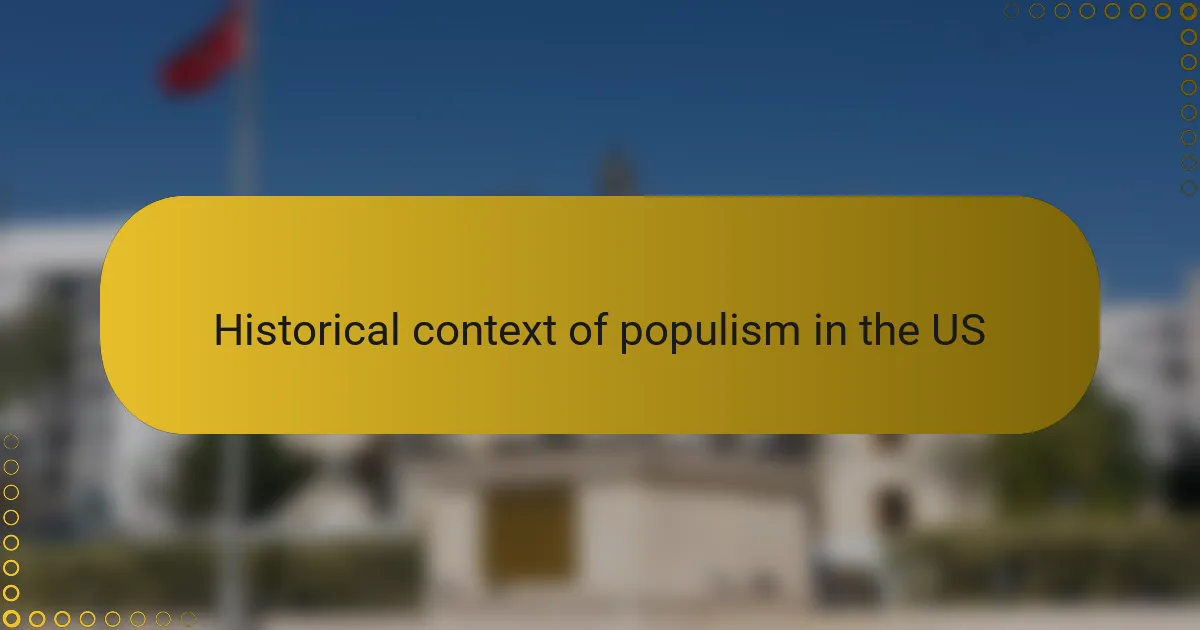
Historical context of populism in the US
Populism in the US isn’t new; it’s been surfacing at different moments in history when people felt ignored or left behind. I recall reading about the late 19th-century Populist movement—farmers demanding fairer economic policies—where frustration with elites and corporations sparked powerful collective action. It makes me wonder if today’s similar feelings are really just history repeating itself.
What I find intriguing is how populism historically has swung between the left and right, showing up in various forms depending on the era’s challenges. For instance, in the 1930s during the Great Depression, figures like Huey Long tapped into widespread economic despair by promising to share wealth. Doesn’t this tell us that populism often thrives when many feel desperate and disconnected from conventional politics?
Reflecting on this, I see populism as a mirror to societal anxieties, amplified during times of rapid change or inequality. When I look back, it’s clear that these movements stir both hope and fear—hope for real change, fear of instability. Do you think today’s resurgence carries the same mix of emotions?
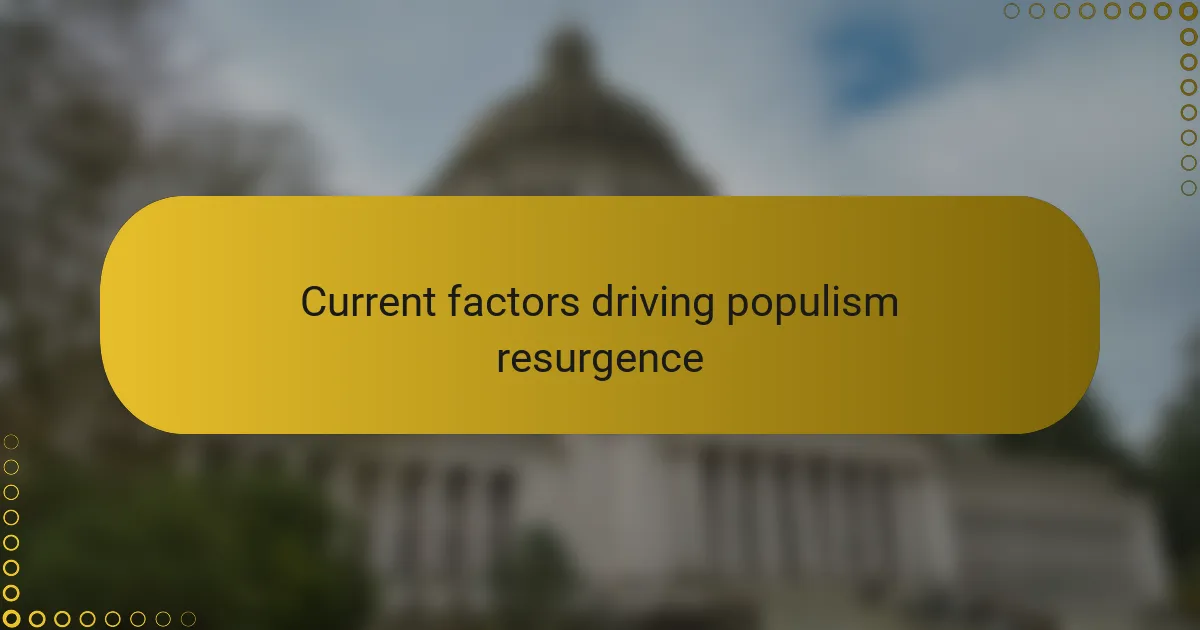
Current factors driving populism resurgence
One factor I keep coming back to is economic anxiety. In conversations with folks across the country, I sense a deep worry about job security, stagnant wages, and rising costs of living. Isn’t it natural, then, that people gravitate towards messages promising to shake up a system they feel no longer serves them?
Another driver I’ve noticed is the rapid pace of social and technological change. For many, this whirlwind creates a sense of losing control or identity. When I reflect on my own experiences adapting to new realities, I can see how populist leaders who offer clear, simple solutions might feel like a comforting anchor.
Lastly, I think polarization and distrust in traditional institutions play a huge role. I often hear listeners express frustration with politicians, media, and experts who seem disconnected or self-serving. This skepticism fuels a hunger for voices that claim to speak “for the people,” doesn’t it? From what I’ve observed, that craving is central to populism’s renewed appeal.
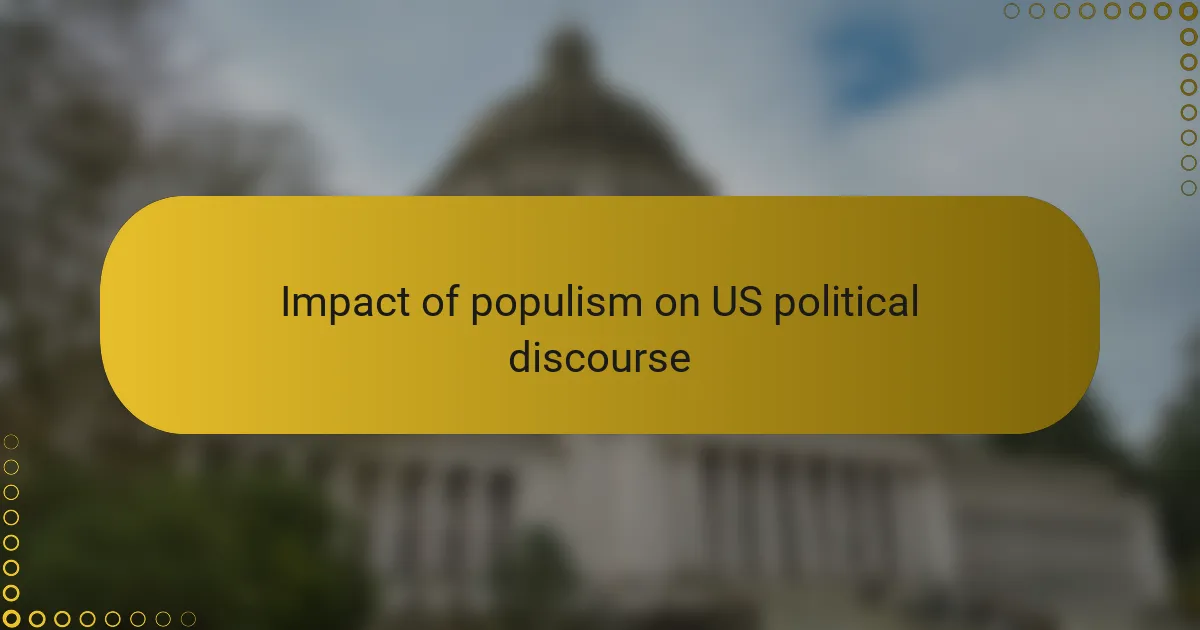
Impact of populism on US political discourse
Populism has undeniably shifted the tone of US political discourse, making conversations more charged and polarized. From my perspective, this shift often means debates get framed as battles between “us” and “them,” which can be energizing for some but alienating for others. Have you noticed how discussions sometimes lose nuance, focusing more on identity and loyalty than on policy specifics?
What stands out to me is how populist rhetoric changes whom politicians address. Rather than speaking to a broad, diverse audience, there’s a clear appeal to a specific “base,” which intensifies feelings of division. I’ve experienced how this narrows the scope of political dialogue, limiting opportunities for compromise or understanding across different groups.
At the same time, populism forces the mainstream to confront issues they might otherwise sideline. I’ve found this dual effect both frustrating and necessary—frustrating because it stirs conflict, but necessary because it pushes certain voices into the spotlight. Does this dynamic ultimately enrich democracy, or does it risk tearing it apart? It’s a question I ponder often.
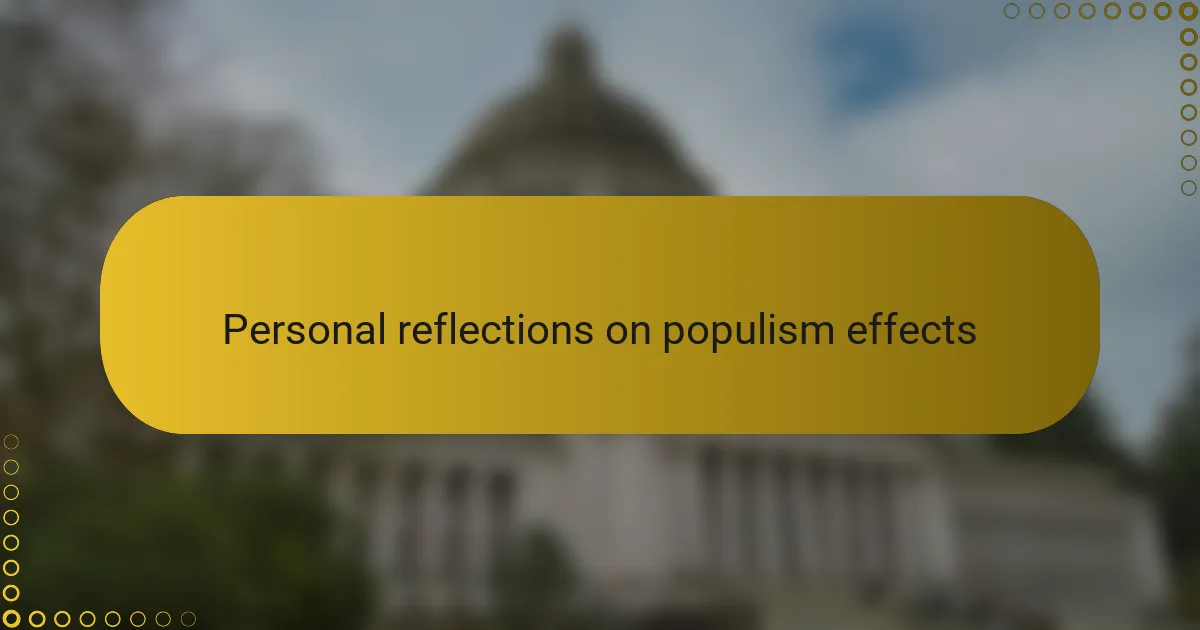
Personal reflections on populism effects
When I think about the effects of populism, I often reflect on how it can both unite and divide in equal measure. I’ve witnessed conversations where people feel galvanized to speak up, yet at the same time, I’ve seen these same movements deepen rifts between communities. Isn’t it fascinating—and sometimes troubling—how something that aims to amplify “the people” can also sow seeds of mistrust?
From my perspective, one personal challenge with populism is navigating its emotional pull. I’ve caught myself swept up in the energy of populist messaging, feeling hope and frustration intertwined. That mix makes it hard to stay objective, and I wonder if many others experience the same tension between passion and skepticism.
At its core, populism seems to tap into a primal need for connection and recognition. I remember during a recent podcast episode, a listener shared how populist rhetoric made them feel seen for the first time in years. Moments like that remind me why, despite its complexities, populism resonates so deeply—and why its effects on our political landscape are both powerful and unpredictable.
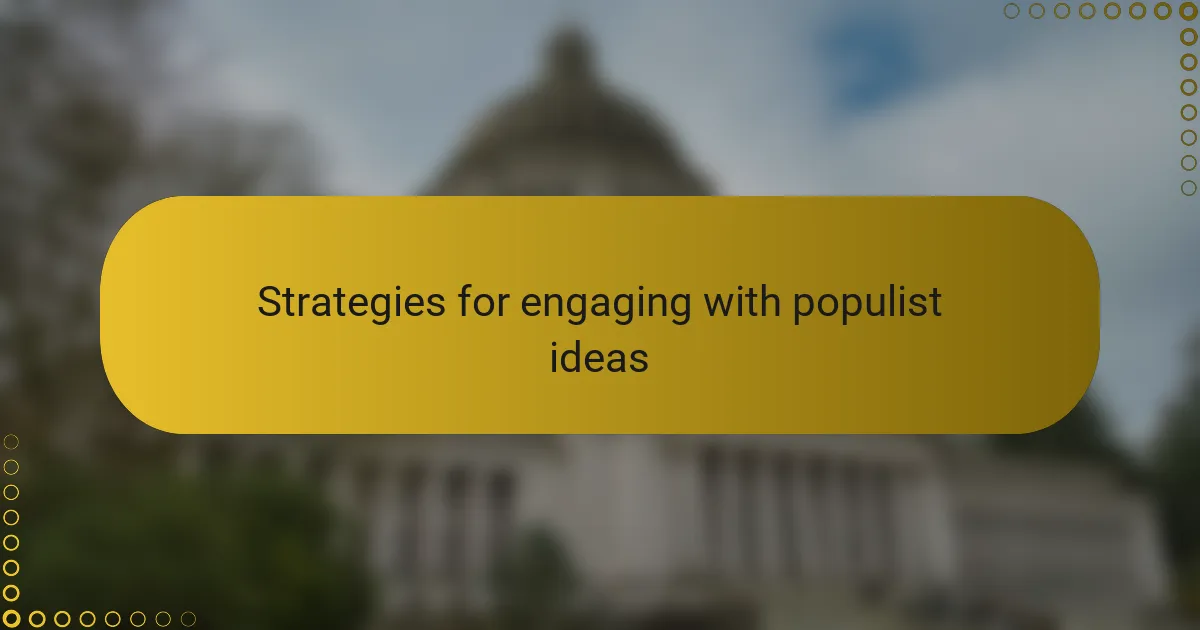
Strategies for engaging with populist ideas
Engaging with populist ideas requires more than just debating facts; it means listening deeply to the emotions beneath the rhetoric. I’ve found that when people feel truly heard, their defensive walls often come down, opening space for richer conversations. Have you ever noticed how genuine empathy can shift a discussion from confrontation to connection?
I also think it’s crucial to challenge simplistic “us versus them” narratives without dismissing the real grievances behind them. In my experience, acknowledging people’s concerns—even when you disagree with their conclusions—creates common ground. This approach doesn’t just defuse tensions; it invites critical reflection on complex issues that populism often glosses over.
Lastly, I try to bring nuance to conversations by sharing stories and perspectives that complicate the binary worldview populism promotes. For example, I might point out how economic hardship affects diverse communities differently, encouraging listeners to look beyond labels. Isn’t it powerful how storytelling can humanize what felt like abstract political battles? That’s a strategy that, for me, makes engaging with populist ideas more productive and less polarizing.